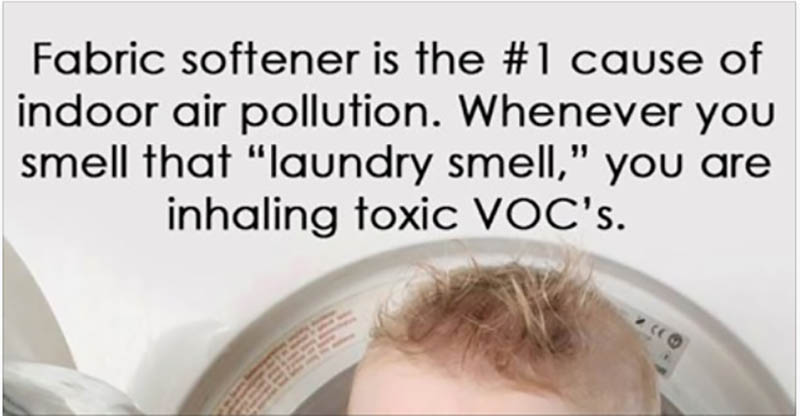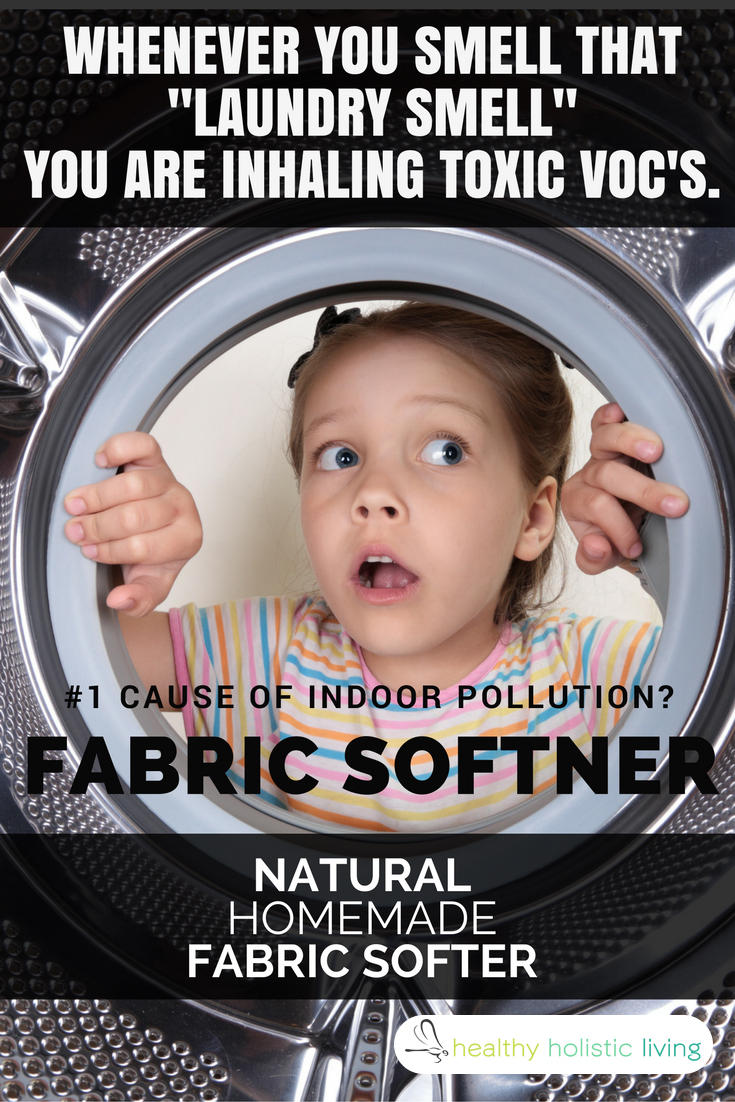Fabric softener ads often portray an image of comfort, freshness and sweetness. Yet most fabric softeners contain a grim list of known toxins which can enter your body through the skin and by inhalation, causing a wide range of health problems, particularly for young children.

Here are some of the harmful ingredients commonly found in liquid or sheet fabric softeners include:
• Chloroform: This substance was used as an anesthesia in the 1800s up through the early 1900s when its potential for causing fatal cardiac arrhythmia was discovered. A carcinogenic neurotoxin, it is on the EPA’s Hazardous Waste list. Inhaling its vapors may cause loss of consciousness, nausea, headache, vomiting, and/or dizziness, drowsiness. It may aggravate disorders of the heart, kidneys or liver. Its effects worsen when subjected to heat.
• A-Terpineol: Causes Central Nervous System (CNS) disorders, meaning problems relating to the brain and spine such as Alzheimer’s disease, ADD, dementia, Multiple Sclerosis, Parkinson’s disease, seizures, strokes, and Sudden Infant Death Syndrome. Early symptoms of CNS problems include aphasia, blurred vision, disorientation, dizziness, headaches, hunger, memory loss, numbness in face, pain in neck and spine. A-Terpineol also irritates the mucous membranes and, if aspirated into the lungs, can cause respiratory depression, pneumonia or fatal edema.
• Benzyl Alcohol: This upper respiratory tract irritant can cause central nervous system (CNS) disorders, headache, nausea, vomiting, dizziness and dramatic drops in blood pressure.
• Benzyl Acetate: This substances has been linked to pancreatic cancer. Its vapors can be irritating to eyes and respiratory passages and it can also be absorbed through the skin.
• Ethanol: Another fabric softener ingredient which is on the EPA’s Hazardous Waste list and linked to CNS disorders.
• Pentane: A chemical known to be harmful if inhaled.
• Ethyl Acetate: This substance, which is on the EPA’s Hazardous Waste list, can be irritating to the eyes and respiratory tract. It may also cause severe headaches and loss of consciousness, as well as damage to the liver and kidneys.
• Camphor: Another substance on the EPA’s Hazardous Waste list. It is easily absorbed through body tissue, causing irritation of eyes, nose and throat. Camphor can also cause dizziness, confusion, nausea, twitching muscles and convulsions.
• Linalool: A narcotic known to cause respiratory problems and CNS disorders. In animal testing, exposure to linalool has resulted in death.
• Phthalates: Used in scented products to help the scent last longer, phthlates have been linked to breast cancer and reproductive system problems.
• Limonene: This known carcinogen can cause irritation to eyes and skin.
• Also, if you follow a vegan lifestyle, you should be aware that many fabric softener sheets are made using tallow, a form of animal fat.
Manufacturers are aware that the products contain toxic chemicals. The packaging on many brands include a warning that the product should not be used on children’s sleepwear. Since some of the same brands also have large images of children and toys, however, consumers may miss the small print message.
Making your own fabric softener is very easy and cost effective . Additionally, using homemade cleaning products helps keep harmful chemicals away. Vinegar is cheap and nontoxic. It naturally removes soap residue, and helps with static reduction during drying. Vinegar contains small amounts of sodium and potassium, which help soften hard water. Homemade fabric softener ingredients are combined with water to make a solution you can store in a container and use each time you do the wash.

Natural Homemade Fabric Softener
Ingredients
- 1 gallon white vinegar
- 30 drops of essential oil (where to buy 100% pure essential oils)
Mix ingredients together and pour into a storage container.
To use:
Dilute the vinegar mixture with water before being used in your laundry. For regular sizes loads, mix 1/4 cup of vinegar mixture with 3/4 cups of water. Pour the fabric softener into your washer during the final rinse cycle.
Get on board with making even more cleaning products yourself. Here are some great recipes to try:
DIY Car Clip-On Homemade Air Freshener
source: http://www.healthy-holistic-living.com/diy-fabric-softener.html?utm_source=NM&utm_content=27195-YRH1